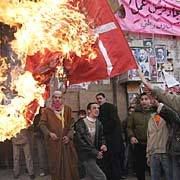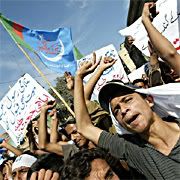By Michael Grunwald
October 27, 2006Rep. Ron Kind pays for sex!

Well, that's what the Republican challenger for his Wisconsin congressional seat, Paul R. Nelson, claims in new ads, the ones with "XXX" stamped across Kind's face.
It turns out that Kind -- along with more than 200 of his fellow hedonists in the House -- opposed an unsuccessful effort to stop the National Institutes of Health from pursuing peer-reviewed sex studies. According to Nelson's ads, the Democrat also wants to "let illegal aliens burn the American flag" and "allow convicted child molesters to enter this country."
To Nelson, that doesn't even qualify as negative campaigning.
"Negative campaigning is vicious personal attacks," he said in an interview. "This isn't personal at all."
By 2006 standards, maybe it isn't.
On the brink of what could be a power-shifting election, it is kitchen-sink time: Desperate candidates are throwing everything. While negative campaigning is a tradition in American politics, this year's version in many races has an eccentric shade, filled with allegations of moral bankruptcy and sexual perversion.
At the same time, the growth of "independent expenditures" by national parties and other groups has allowed candidates to distance themselves from distasteful attacks on their opponents, while blogs and YouTube have provided free distribution networks for eye-catching hatchet jobs.
"When the news is bad, the ads tend to be negative," said Shanto Iyengar, a Stanford professor who studies political advertising. "And the more negative the ad, the more likely it is to get free media coverage. So there's a big incentive to go to the extremes."
The result has been a carnival of ugly, especially on the GOP side, where operatives are trying to counter what polls show is a hostile political environment by casting opponents as fatally flawed characters. The National Republican Campaign Committee is spending more than 90 percent of its advertising budget on negative ads, according to GOP operatives, and the rest of the party seems to be following suit. A few examples of the "character issues" taking center stage two weeks before Election Day:
· In New York, the NRCC ran an ad accusing Democratic House candidate Michael A. Arcuri, a district attorney, of using taxpayer dollars for phone sex. "Hi, sexy," a dancing woman purrs. "You've reached the live, one-on-one fantasy line." It turns out that one of Arcuri's aides had tried to call the state Division of Criminal Justice, which had a number that was almost identical to that of a porn line. The misdial cost taxpayers $1.25.
· In Ohio, GOP gubernatorial candidate J. Kenneth Blackwell, trailing by more than 20 points in polls, has accused front-running Democratic Rep. Ted Strickland of protecting a former aide who was convicted in 1994 on a misdemeanor indecency charge. Blackwell's campaign is also warning voters through suggestive "push polls" that Strickland failed to support a resolution condemning sex between adults and children. Strickland, a psychiatrist, objected to a line suggesting that sexually abused children cannot have healthy relationships when they grow up.
· The Republican Party of Wisconsin distributed a mailing linking Democratic House candidate Steve Kagen to a convicted serial killer and child rapist. The supposed connection: The "bloodthirsty" attorney for the killer had also done legal work for Kagen.
· In two dozen congressional districts, a political action committee supported by a white Indianapolis businessman, J. Patrick Rooney, is running ads saying Democrats want to abort black babies. A voice says, "If you make a little mistake with one of your hos, you'll want to dispose of that problem tout de suite, no questions asked."
· In the most controversial recent ad, the Republican National Committee slammed Rep. Harold E. Ford Jr. (D-Tenn.) for attending a Playboy-sponsored Super Bowl party. In the ad, a scantily clad white actress winks as she reminisces about good times with Ford, who is black. That ad has been pulled, but the RNC has a new one saying Ford "wants to give the abortion pill to schoolchildren."
Some Democrats are playing rough, too. House candidate Chris Carney is running ads slamming the "family values" of Rep. Don Sherwood (R-Pa.), whose former mistress accused him of choking her. And House candidate Kirsten Gillibrand has an ad online ridiculing Rep. John E. Sweeney (R-N.Y.) for attending a late-night fraternity party. "What's a 50-year-old man doing at a frat party anyway?" one young woman asks, as a faux Sweeney boogies behind her to the Beastie Boys. "Totally creeping me out!" another responds.
But most harsh Democratic attacks have focused on the policies and performance of the GOP majority, trying to link Republicans to Bush, the unpopular war in Iraq and the scandals involving former representative Mark Foley and former lobbyist Jack Abramoff. That is not surprising, given that polls show two-thirds of the electorate thinks the country is going in the wrong direction. And studies show that negative ads can reduce turnout; Democrats hope a constant drumbeat of scandal, Iraq and "stay the course" will persuade conservatives to stay home on Nov. 7.
It is harder for Republicans to blame out-of-power Democrats for the current state of Washington, but they are equally eager to depress Democratic turnout and fire up their conservative base. One GOP strategy has been raising the specter of House Minority Leader Nancy Pelosi, a San Francisco liberal, becoming speaker; for example, Rep. John N. Hostettler (R-Ind.) is airing radio ads warning that a Democratic victory would allow Pelosi to "put in motion her radical plan to advance the homosexual agenda." Then again, Hostettler's opponent, Democrat Brad Ellsworth, has accused him of promoting the sale of guns to criminals, "including child-rapists."
Some of this year's negative ads are more substantive, reprising a successful Republican strategy from 2002 and 2004: portraying Democrats as soft on terrorism. For example, Rep. Nancy L. Johnson (R-Conn.) has an ad lambasting her opponent for opposing Bush's efforts to conduct wiretaps without search warrants. A host of Democrats have been accused of trying to "cut and run" in Iraq -- including House candidate Tammy Duckworth of Illinois, who lost both legs in Iraq.
The RNC has raised eyebrows with an ad consisting almost entirely of al-Qaeda videos starring Osama bin Laden and his top deputies. There is no sound except the ticking of a bomb before the final warning: "These are the stakes. Vote November 7th." John G. Geer, a Vanderbilt professor who has written a book defending negative political ads, said he told a well-connected Republican friend in Washington that the ticking-bomb ploy seemed like a desperation move. The friend e-mailed back: "John, we're desperate!"
"Look, the electorate is polarized, the stakes are large, and neither party has much to run on right now," Geer said. "You can expect to see some pretty outlandish ads."
The "pays for sex" ad against Kind in Wisconsin -- along with a similar one aired against Rep. Brad Miller (D-N.C.) -- may be the most extreme. It says Kind spent tax dollars to study "the sex lives of Vietnamese prostitutes" and "the masturbation habits of old men" and "to pay teenage girls to watch pornographic movies with probes connected to their genitalia." Cue the punch line: "Ron Kind pays for sex, but not for soldiers." The Wisconsin Republican Party denounced the ad, and several TV stations refused to air it, but that only got it more attention. It is the centerpiece of Nelson's Web site: "This ad is so powerful, a sitting U.S. Congressman threatened TV stations with legal action if they dared to play it."
Kind joked in an interview that he has been paying for sex ever since he said "I do." But on a more serious note, he said Nelson's attack ad is typical of modern politics, in which desperate candidates can attract media coverage and rally their base with distortion. He opposed the amendment in question -- as did many Republicans -- because he does not think Congress should interfere in peer-reviewed NIH studies, not because of any interest in teenage genitalia. That particular study, incidentally, had nothing to do with teenagers.
"Man, it's a crazy system, and it's getting worse every year," Kind said. "We rip each other to shreds, and then we're all supposed to come back to Washington and try to work together. It's a hell of a way to elect representatives."
At least it is clear who is responsible for Nelson's ad: Nelson. The Playboy ad bashing Ford, on the other hand, is a typical product of the attack politics of 2006. Its beneficiary, GOP Senate candidate Bob Corker, called it "tacky" but said he cannot do anything about an RNC ad. Even RNC Chairman Ken Mehlman said he is powerless to stop it; it is an "independent expenditure" of the RNC, out of the committee's control. He doesn't seem too upset about it, though. Corker has been rising in the polls since it started airing.
Experts say that in the past, negative ads were usually more accurate, better documented and more informative than positive ads; there was a higher burden of proof. Stanford's Iyengar thinks that is still true for candidate-funded messages, which now require candidates to say they approved them. But it is not true when the messages are produced by political parties, shadowy independent groups or partisans posting on YouTube.
"You're going to see more of this sensational, off-the-wall stuff," Iyengar said. "If you get people disgusted, they might withdraw from politics, and that's the real goal these days."
Read more...
 The Bush administration is failing to counter Islamist online propaganda that could propel militancy into the next generation, experts say.
The Bush administration is failing to counter Islamist online propaganda that could propel militancy into the next generation, experts say.





 A Danish court has dismissed a legal action against the newspaper that published 12 cartoons of the prophet Mohammed, triggering huge protests around the world. Furious Muslims took to the streets claiming the drawings were blasphemous and insulting.
A Danish court has dismissed a legal action against the newspaper that published 12 cartoons of the prophet Mohammed, triggering huge protests around the world. Furious Muslims took to the streets claiming the drawings were blasphemous and insulting. The City Court in Aarhus said it accepted some Muslims had been offended by the drawings, printed last September in Jyllands-Posten, but it added there was no reason to assume the cartoons were meant to "belittle Muslims".
The City Court in Aarhus said it accepted some Muslims had been offended by the drawings, printed last September in Jyllands-Posten, but it added there was no reason to assume the cartoons were meant to "belittle Muslims".  The seven Muslim groups filed the defamation lawsuit against the paper in March, after Denmark's top prosecutor decided not to press criminal charges. He said the drawings did not violate the country's laws against racism or blasphemy.
The seven Muslim groups filed the defamation lawsuit against the paper in March, after Denmark's top prosecutor decided not to press criminal charges. He said the drawings did not violate the country's laws against racism or blasphemy. 



 Former chess champion Garry Kasparov, an outspoken critic of Russian President Vladimir Putin, said on Thursday he fears for his safety in the wake of the weekend murder of a critical Russian investigative journalist, AFP news agency reports.
Former chess champion Garry Kasparov, an outspoken critic of Russian President Vladimir Putin, said on Thursday he fears for his safety in the wake of the weekend murder of a critical Russian investigative journalist, AFP news agency reports.



